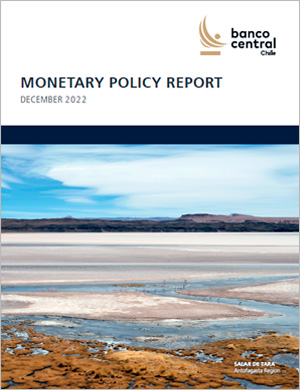Monetary Policy Report December 2022
Monetary Policy Report December 2022

The Chilean economy has continued with its adjustment process following the major imbalances it accumulated during 2021. Annual inflation, in line with expectations, peaked in the third quarter. Inflation expectations remain above 3% in the two-year horizon. Private consumption continues to contract after the sharp increases it posted in 2021. Investment, on the other hand, surprised on the upside in the third quarter, concentrated in specific sectors, such as renewable energy, which contributed to a widening of the current account deficit in the third quarter. The world economic outlook is complex, given the high persistence of global inflation and rate hikes by the main central banks. The Board has made a significant adjustment in monetary policy, which has contributed to the gradual easing of inflationary pressures and will allow confront these difficulties from a better position. However, the activity gap remains wide and inflation remains well above the target, both signs that the adjustment process of the Chilean economy is yet to be completed. The Monetary Policy Rate (MPR) is at 11.25% and will remain at that level until the state of the macroeconomy indicates that the convergence process of inflation to the 3% target has been consolidated.
What does this MP Report tell us?

The Chilean economy continues to adjust following the excessive increase in spending in 2021.
- Just as expected, economic activity has begun to slow down in recent months, reflecting the strong level of spending observed last year.
- The adjustment of the economy is necessary for resolving the imbalances between saving and spending caused by the exceptional increase in the latter.
- This will provide the right conditions for inflation to return to the 3% target.

Inflation will decline in the coming months.
- Inflation is still very high despite its recent decline.
- Its annual variation peaked at 14.1% last August and has been declining since then.
- It is expected to decline in 2023, and to meet the 3% during the year 2024.
- The adjustment of the local economy and the reduction of high cost pressures will continue to contribute to the decline in inflation.
- For the Central Bank, bringing down inflation is a priority as it affects every family, especially those more deprived of resources.

Many risks remain, however, the most important of which being associated with what happens in the rest of the world.
- Many countries are also enduring the costs of high inflation, which explains why their central banks have also raised interest rates.
- Estimates are that the major economies, such as the United States and Europe, will face a recession in 2023.
- Other economies that are important for our exports (i.e., China), will maintain slow growth.
- In this scenario, developments in the rest of the world will be no help for our economy to grow in 2023.
- In addition, there are several factors that could be a negative influence, including the Russia-Ukraine war, a conflict that could further affect the prices of energy and foods, plus the supply of products worldwide.

The Central Bank will continue to do everything necessary to lower inflation.
- Inflation continues to be very high and is taking a toll on every household and business.
- The Bank has already raised its interest rate significantly, which is sufficient to bring inflation back to 3% by 2024.
- As the remaining imbalances in the economy are resolved, inflation will continue to fall. This will allow for interest rates to be lowered gradually, although this will take some time.
Presentations
Presentación IPoM Senado
Conferencia de Presna IPoM
- Informe de Política Monetaria diciembre 2022. Rosanna Costa, Presidenta
- Informe de Política Monetaria diciembre 2022. Rosanna Costa, Presidenta. Icare
- Informe de Política Monetaria diciembre 2022. Luis Felipe Céspedes, Consejero
- Informe de Política Monetaria diciembre 2022. Stephany Griffith-Jones, Consejera
